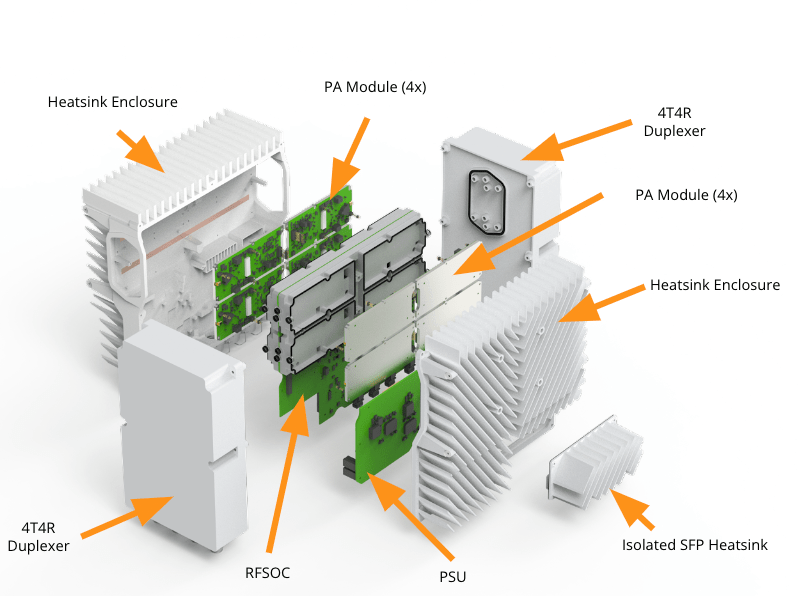- Meta is transferring its IP for Evenstar, a program to accelerate the adoption of open RAN technologies, to the Open Compute Project (OCP).
- Meta will contribute Evenstar’s radio unit design to OCP, giving the telecom industry its first open, white box radio unit solution.
- The TIP Open RAN community will leverage the Evenstar radio unit reference designs to drive productization, validation, and commercialization of new Open RAN hardware variants.
- The OCP community will evolve Evenstar with the requirements of the broader ecosystem in mind and develop a multi-vendor supply chain.
Over the past three years, Meta engineers have been working alongside our ecosystem partners on Evenstar, a collaborative effort to accelerate the adoption of open radio access networks (RANs) through simplified, flexible, and efficient RAN technologies. By driving open source standards, we’ve been helping to deliver innovative radio products and lower the total cost of ownership for operators.
Now that the project has matured to a point where the wider telecom community can fully benefit, we’re officially opening up Evenstar’s design to the wider open RAN community. We will, however, be continuing our collaboration with OCP to help our ecosystem of partners develop and deploy new open RAN solutions for the industry. Earlier this year we contributed Open M-Plane, the software component of Evenstar for configuring and managing RANs, to the Linux Foundation as part of our collaboration on the LF Connectivity project.
“OCP is very pleased to be the home of the hardware specification along with firmware for [Evenstar], a completely open RAN radio unit,” said Bijan Nowroozi, CTO of the Open Compute Project Foundation. “It is an absolute milestone towards a truly open RAN…OCP strives to foster a community where anyone can contribute, anyone can improve, and anyone can innovate.”
Contributing Evenstar’s design to the open RAN community
Evenstar began as a way to bring together a set of industry players to work toward the common goal of building a stable, open, and interoperable infrastructure supply chain for RAN. We’ve since made significant progress in building a modular reference design for a disaggregated radio unit platform, and now we’re sharing this with OCP as a hardware base specification to enable the ecosystem to build modularized and efficient radio unit platforms.
“Key elements of the specification feature an advanced 4T4R MIMO transceiver capable of 40W [per] stream of RF power and a highly-modular design that is useful in real world use cases,” said Nowroozi. “The hardware specification addresses deployment challenges by reducing the total number of SKUs required for worldwide availability.”
Evenstar’s design is based on several novel solutions that address electrical and mechanical design challenges associated with the high-power, dual-band radio units that are emerging in the open RAN ecosystem. Evenstar’s firmware, which has also been contributed to OCP and open sourced, handles complex signal processing algorithms such as digital pre-distortion (DPD) and crest factor reduction (CFR).
Evenstar’s radio unit architecture was designed by Meta with modularity in mind. The modular assembly is a critical disaggregation tenet that enables the mixing and matching of radio unit components (power amplifiers, power supply units, etc.) from different suppliers and provides flexibility in rebanding for a range of radio units.

The design relies on off-the-shelf discrete components, which is expected to result in a lower bill of materials (BOM) cost, with the additional benefit of being able to independently control each of the power amplifier modules (PAMs) for optimized power savings and increased radio unit efficiency.
All modules have been designed, manufactured, and tested in the lab on an individual basis for viability. This hardware design can support the commercial manufacturing of a range of radio units, with the platform anchoring a modular concept to assemble power amplifiers (PAs), radio silicon, and other components from a best-of-breed supply chain. We expect the modular design based on open interfaces will lead to faster innovation and thereby reduce adoption barriers.
In addition to the hardware base specification and firmware, a comprehensive set of design files and test scripts will be accessible via the OCP website, including:
- Power amplifier modules (PAMs)
- Power supply unit (PSU)
- Digital control module (board)
- Resonant cavity duplexer filter module
- Mechanical design
- DPD firmware
- CFR firmware
- Test automation scripts (including Massive MIMO)
Accelerating open RAN commercialization
Evenstar will be the industry’s first open, white box radio unit solution as the industry continues to pave the way for further adoption of open RAN technologies.
Jabil, a manufacturing solutions provider, has been a key partner in the Evenstar program. It took the lead on developing and producing modular and standards-based radio units based on operator-specified requirements. We’ve been working closely with Jabil to scale our contribution, helping to commercialize the technologies that will drive global adoption. Jabil has been a trusted manufacturing partner for 5G radios and has been providing the telecommunications industry with best-in-class execution for more than two decades.
Vodafone has also been a strong supporter and key contributor to Evenstar and open RAN technologies, having previously announced plans to deploy at least 2,500 open RAN sites in rural areas across the UK by 2027. After contributing requirements and supporting the Evenstar radio unit development program with Jabil, Vodafone is now finalizing plans to take the first units into the lab for testing and validation before entering the field trial phase. With its first open RAN sites already live in the South West of England, we are excited to see Vodafone pave the way for disaggregated RAN solutions in the network.
“This major contribution from Meta will provide the open RAN ecosystem with the right level of stimulus and encouragement to scale the radio unit portfolio in the industry,” said Yago Tenorio, Vodafone fellow and director of network architecture, and TIP Chairman. “We look forward to how this contribution will enable some of the best radio solutions out there for upcoming open RAN deployments.”
Continuing our collaboration with OCP
Open sourcing Evenstar’s radio unit reference design is an exciting next step towards a healthy, robust, and sustainable ecosystem for open RAN infrastructure offerings. We expect field trials and scaled deployments for open RAN to accelerate significantly in 2023. We believe this contribution to the ecosystem will provide a significant time to market advantage to radio unit supply partners as they develop products that will further increase efficiencies around cost, size, and power for RAN components.
We look forward to seeing this reference design moving beyond specifications into a deployable radio platform that will accelerate the adoption of the technology in networks as operators roll out their open RAN solutions.










